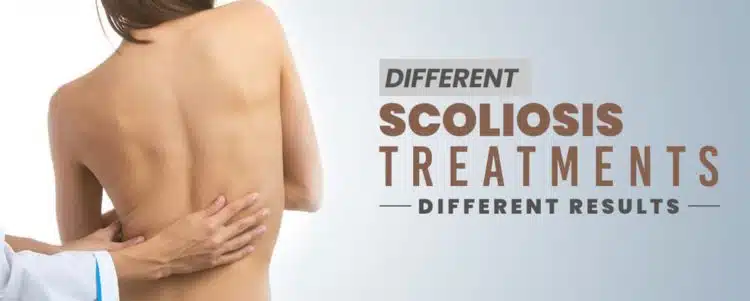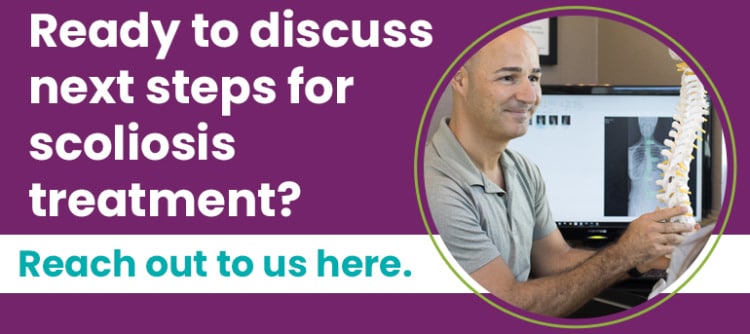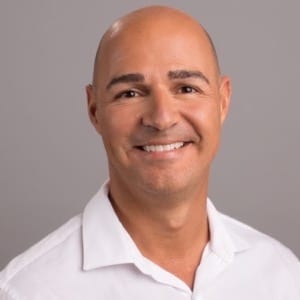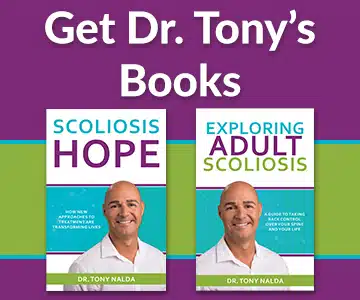When researching scoliosis treatments, people typically discover that there are two schools of thought: On one hand there is the traditional, well-established orthopedic method. This type of scoliosis treatment is based on a conservative, reactive approach that involves observation, bracing and, eventually, surgery.
On the other hand, there is the chiropractic-centered approach to scoliosis treatment. This approach is much more proactive, and it involves scoliosis-specific chiropractic care in addition to exercise, physical therapy and specialized bracing.
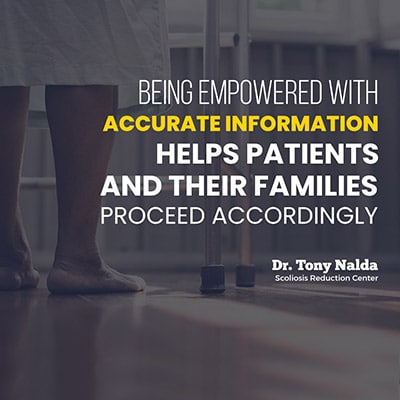
Obviously, I am biased toward the chiropractic-centered approach. I have devoted my life and profession to this type of scoliosis treatment, and the positive results my patients have achieved speak for themselves.
However, I think it is useful to compare the two scoliosis treatments so patients and parents can decide what is actually best for them and their specific situation. I believe that the people who are affected most directly by scoliosis should have access to the latest knowledge and insights. Being empowered with accurate information helps patients and their families proceed accordingly, regardless of the type of scoliosis treatments they select.
Diagnosing Scoliosis
Diagnosing scoliosis is the first step toward treating the condition.
Traditional Treatment
Patients may be screened in school or elsewhere using the Adam’s Forward Bend Test, or they may visit their doctor complaining of symptoms. The presence of the condition is typically confirmed using an X-ray, and a Cobb angle measurement is taken.
Chiropractic-Centered Treatment
Diagnosis is much the same as traditional treatment. However, I will look at multiple X-rays to determine the size and nature of the abnormal curvature in three dimensions. Because I specialize in scoliosis, I am able to learn quite a bit about the individual’s condition from viewing X-rays and scans in addition to speaking with the patient directly. This helps me craft a treatment plan that is custom designed for that specific patient.
Observation
Most traditional treatment methods rely on a “watch-and-wait” approach.
Traditional Treatment
Once the condition has been diagnosed, most conventional doctors will recommend observation instead of action. They want to see what will happen with the spine in terms of the curvature’s progression.
Chiropractic-Centered Treatment
Honestly, I do not believe there is much value in the “watch-and-wait” approach. To me, a diagnosis of scoliosis should spur action. The sooner we can start working with a patient, the more likely it is that they can experience relief and reduction.
Scoliosis Bracing
Braces are common to most forms of scoliosis treatment. There are some key differences to note, though.
Traditional Treatment
Adolescents are typically fitted with a Boston Brace or Milwaukee Brace. These braces have been around for decades, and have not changed much over the years. Patients are directed to wear these cumbersome braces for 18 or more hours each day. They work by squeezing the spine into position, but they do not incorporate critical strengthening and stabilizing.
Chiropractic-Centered Treatment
I also use bracing technology in my chiropractic-centered approach. Crucially, our braces are much different from traditional apparatus. They are designed specifically for each patient (as opposed to being mass produced). Furthermore, they push the spine in a corrective manner, versus squeezing the spine in a manner that limits function.
Scoliosis Exercises
Staying physically fit is an important component of a scoliosis treatment plan.
Traditional Treatment
Most conventional doctors will not recommend exercises designed to strengthen the spine and the surrounding muscles. In fact, they may actively discourage patients from engaging in any kind of exercise or physical-fitness regimen. Traditional bracing apparatus also make it very difficult for patients to exercise or maintain their fitness levels.
Chiropractic-Centered Treatment
I believe exercise is a cornerstone of recovery and reduction for scoliosis patients. Scoliosis-specific exercises help patients reduce their curvatures, gain strength and improve mobility. I also recommend that young patients participate in sports and other activities that involve body movement. Staying active makes the body stronger and more agile, which aids the healing process tremendously.
Physical Therapy
Physical therapy for scoliosis works in concert with exercise, bracing and chiropractic care to reduce curvatures, build strength and improve function.
Traditional Treatment
Physical therapy is rarely recommended. It simply does not fit within the conventional “watch-and-wait” approach.
Chiropractic-Centered Treatment
Like exercise, scoliosis-specific physical therapy is a fundamental component of chiropractic-centered scoliosis treatment. We use different specialized pieces of equipment, such as the Scoliosis Traction Chair, in addition to a wide range of modalities that mobilize the spine into a corrected position. This type of physical therapy works to reverse scoliosis by creating a mirror image of the condition. Of course, each patient needs their own custom-designed physical therapy approach in order to achieve positive results. Here at the Scoliosis Reduction Center®, we do exactly that.
Scoliosis Surgery
Conventional wisdom says that surgery is ultimately the only effective treatment method for scoliosis.
Traditional Treatment
Under the conventional model of scoliosis treatment, all paths eventually lead to expensive, invasive surgery. All the watching and waiting involved in this approach only ensures that the spinal curvature will progress. This leads patients to the point at which surgery becomes “necessary.” Recovery from surgery becomes a lifelong pursuit, even if the scoliosis curvatures have been reduced.
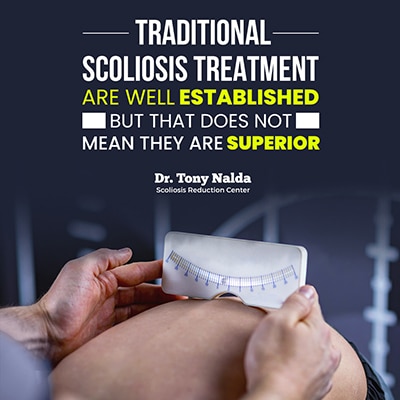
Chiropractic-Centered Treatment
This is where my approach differs from the traditional treatment model most dramatically. Everything I do as a scoliosis chiropractor is meant to help patients improve so they can avoid surgery.
See the Difference?
These two scoliosis treatments both promise results. But I believe strongly in the chiropractic-centered treatment method. Yes, I am biased, but my patients have achieved results that back up everything I believe. Traditional scoliosis treatments are well established. But that does not mean they are superior. Far from it.
